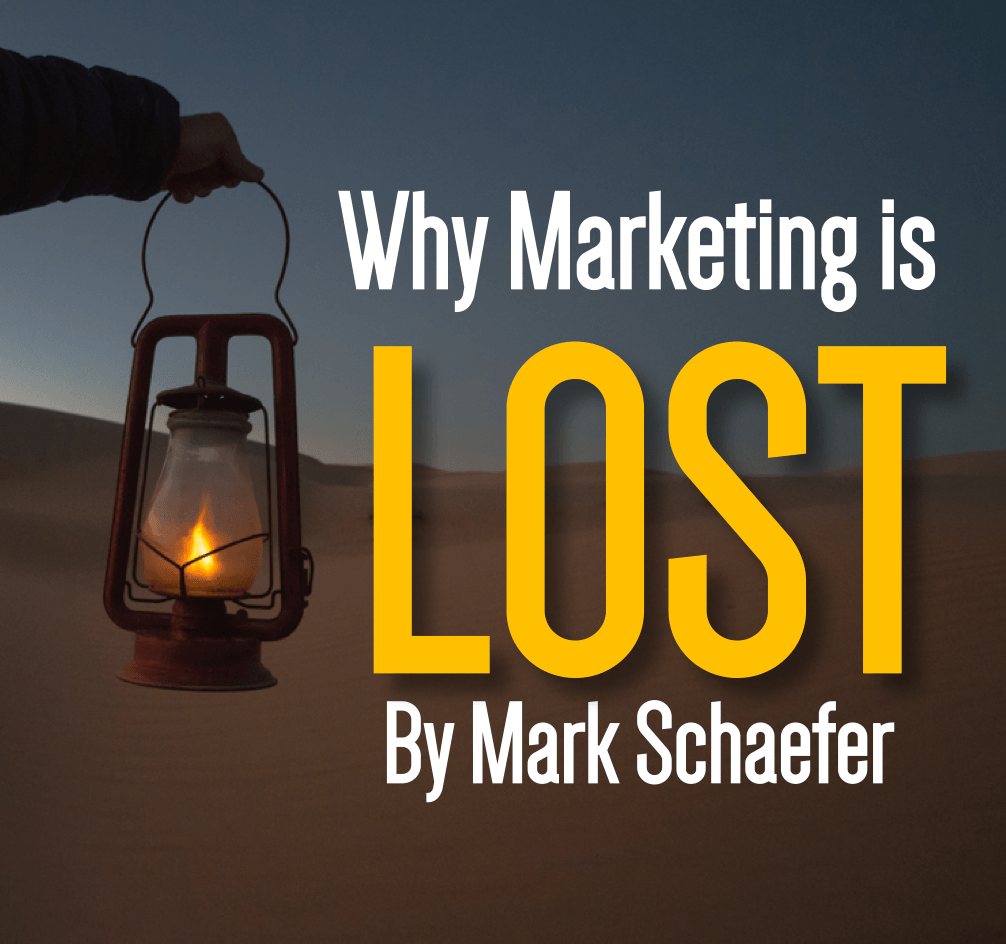By Mark Schaefer
In the medical profession, technology is being used to cure disease, significantly improving life expectancy nearly everywhere in the world.
In the automotive industry, we are at the dawn of nearly miraculous connected, self-driving vehicles.
And in physics, technology is being applied to unlock the very secrets of our universe.
In my own beloved profession of marketing, the primary application of technology is to find increasingly sophisticated ways to annoy people.
And this, my friends, is the central professional issue of our day.
Marketing has lost its way.
The source of the problem
That’s a bold statement and I’d like to back it up by comparing what marketing used to be, what marketing is becoming, and why mis-use of technology is the central problem.
When I was a young marketing executive in the pre-Big Data days, I worked for a Fortune 100 company that had hundreds of customers all over the world.
To keep on top of this diverse marketplace, I pored over every sales and service report looking for ideas, feedback, and trends that would give me an edge. I was on the road with customers all the time and once a year we had “listen to the customer” visits, where a trained, cross-functional team sat down in a very formal, structured research meeting to unearth new product and service opportunities.
I was obsessed with learning about our customers and their un-met needs. I knew that to win I had to be feverishly seeking opportunities to create customer delight that led to loyalty, and perhaps profitable new sales.
I built my career and my reputation by listening well, reacting effectively, and creating innovative new value. To me, that’s what marketing is about.
Marketing today
In my career today I am fortunate to interact with many marketers in lots of different industries. I am seeing a disturbing pattern, across the board: We’re becoming over-reliant on data and dashboards to know what to do.
In one extreme example, I was working with a business leader who was relying on Twitter sentiment analysis to direct his product development efforts. He was investing more and more in his IT department to create algorithms that would distill some logic from the wall of Twitter noise.
He seemed to be so locked in to the mystery of the data before him that he was overlooking the more obvious fact that most of his customers weren’t even on Twitter. When I suggested that he pick up a phone and call some customers, he turned pale.
Marketing is out of the hands of marketers
This little story is a symptom of the larger disease.
The heart, the soul, the truest pulse of marketing is vaporizing because our profession is turning into a glorified IT function. Marketing strategy is being derived from data scientists, SEO gurus, and statisticians doing A/B testing in a back room somewhere.
We are implementing strategies and tactics based on what statistically is supposed to work, instead of what customers really want.
Here is an example of that: pop-up ads.
There are many research reports concluding that consumers LOATHE pop-up ads. At this point, there is no rational marketing professional who can believe that people like these annoying ads.
But if you ask a marketer why they do it, they say “because they work.”
But people hate them.
But they work.
And so it goes.
I see the same thing happening with “lead nurturing,” which is just a friendly way to say “I am going to keep barraging you with emails until you block me.”
We know people hate that.
But some data analyst at Hubspot shows that the technique works, so we do it anyway. And when everybody else is doing it, it becomes OK. We do it because we’re afraid not to do it.
When I was a college kid, I fell in love with marketing because it was the frontline of any business. It was an occupation obsessed with serving customer needs and creating new value in the world. When you get down to it, it was about creating love … love of a product, a service, a brand, even a price.
Today, marketing is best known for doing the stuff that people hate.
Creating hate at scale
This problem is now grotesquely amplified through marketing technology. We can literally spam millions of people at almost no cost. At the push of a button.
One person justified this practice to me: “We’re expected to blast pitches because one out of a million will actually respond. Maybe it hits them with the right message at the right time.”
True.
But you are also annoying 999,999 people.
You see, the problem is just going to get worse — much worse — as “marketing technology” becomes synonymous with “creating consumer hate at scale.”
With the amount of personal data being collected today, I believe we’re on the cusp of an era of unprecedented creepiness. Somebody in analytics is going to recommend a marketing tactic that crosses a line of ethics because … “it will work.” It is already happening. I predict that we’ll soon see some epic marketing failures in our business when the decisions are based on probability analysis versus common sense and good taste.
The most important question
For years Edelman has traced the decline in trust between consumers and companies through its Trust Barometer report. Trust is at an all-time low for many companies and I have to wonder … is part of this because consumers are sitting out there thinking … “you know we hate this stuff you do. Why do you keep doing that to us?”
Somebody is sure to respond to this post with “but Mark, there is no bad technology. Only bad marketers.”
This is not necessarily true. The marketer and the application of the technology represents a system. The marketer can be defined by the technology. The technology can be defined by the marketer. It is symbiotic.
So how do we get out this loop? A complicated problem.
We are not going to slow the race toward AI everything. We’re not going to eliminate lazy marketing.
The answer to the problem isn’t in a database.
The answer is certainly not in a pop-up ad.
But the answer might reside in the answer to a simple question:
What do our customers love?
Now, go do that.

Illustration courtesy Unsplash.com



